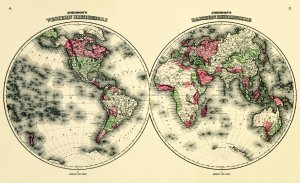
Source: Huffington Post
There are so many things that we obsess over when preparing for a date.
What will I wear? Gotta make sure my breath doesn’t stink! Should I bring a gift? What if I say the wrong thing? Should I reveal XYZ about me?
The primary dating script, as advertised by American pop culture (most notably, romantic comedies), supposedly serves as a map to help us navigate romantic love’s rough, rough terrain.
However, in a society that privileges different types of people over others, that map is filled with hazardous roadblocks for some and traffic-free highways for others.
One of the most significant factors in determining who gets assigned which roles from the dating script is money. In fact, money is such a big deal in romantic partnerships that it has become one of the leading causes of divorce in the US.
And that makes complete sense given that, for most of us living on the margins, money is a difficult resource to come by. When we spend it, how we spend it, and who is spending it all come under scrutiny in this classist society.
Consequently, who pays for the date (and the contract that payment supposedly creates) is usually rooted in assumptions about gender and sexuality that deserve a lot more scrutiny.
For example, the script assumes that 1) the people dating are a man and a woman; 2) the man and woman are both cisgender; 3) at some point, the relationship will progress to sex; and 4) the man is supposed to take the lead.
It neglects, however, to acknowledge that same-gender relationships exist; that trans, agender, and gender non binary people exist and have dating lives; that asexual people exist and have dating lives; and that people tend to structure relationships in different ways based on their individual needs.
This script is violent because, amongst other things, it intensely perpetuates rape culture.
When we accept that “the man” is supposed to take the lead and expect that sex is the designation point on the love map, we create a dangerous power imbalance and turn sex (and the other person’s body) into commodity.
This is why some people believe that if they pay for a date, they are “owed” something at the end of it (and that if that “something” isn’t given voluntarily, it can be taken).
Not only is this dating script the epitome of just how subtly patriarchy creeps into every aspect of our lives – even the parts we want to be sweet and butterfly-filled – but it’s also ridiculously pervasive.
These patriarchal gendered dynamics show up with the same subtle frequency in LGBTQIA+ communities.
While we may complain amongst ourselves about questions like “Who is the man in the relationship?” the truth is that we carry some extremely heterocentric assumptions and expectations into our queer dating lives.
It is nothing to be ashamed of; oppression is purposefully subtle in this way. We can’t help but absorb the messages that already existed when we entered the world – especially if those messages say something about our own identities.
But as feminists – as human beings – it’s important that we free ourselves from these toxic practices and beliefs so that we can move toward creating connections that allow us to be our full selves in spaces that recognize the diversity and value of our individual experiences.
Here are a few tips that we can all use to begin thinking critically about who pays for dinner.
Before the Date
One of the most important ways to think critically about the dating script and our personal relationship to it is to examine what portions of it we’ve already absorbed.
Did you, as a cis girl, like a boy in school, but waited in vain for him to ask you out, instead of taking initiative?
Did you exclusively date people of a different gender than your own in an attempt to mask your same gender desires? Did you harm yourself in an attempt to fix what you believed was “wrong” with you?
Did you find yourself struggling financially because you believed that a “real man” always pays for the date, but your working class background made it difficult to meet what you believed were dates’ expectations and tend to your responsibilities?
Did you dream of finding your Cory or your Topanga?
As feminists working to dismantle gender inequality, it can be a difficult process to admit that we have been complicit in oppressive social norms.
The unlearning that’s necessary to tackle all of the racism, sexism, classism, cissexism, ableism, fatphobia – and so much more – is a neverending process. It takes time.
We are assaulted with toxic, oppressive messages about everything – including money and love – all the time. You can forgive yourself right now for being imperfect in an imperfect world.
But while it’s important to be compassionate with ourselves, we must be accountable and self-reflective as well. The impact of classism is multiplied for those of us whom identify with multiple oppressed identities.
When thinking about who pays for dinner, we need to carefully examine our social privileges and pay attention to the biases we bring to the table about the financial status, ability, and background of our dates.
We need to unpack the toxic assumptions we carry with us that are harmful and/or oppressive in our dating lives.
This is the sort of internal process that necessitates clear and honest communication within ourselves. It’s also what’s necessary to begin creating our own maps to a more liberated, self-aware style of dating.
Though I haven’t dated much, I’ve internalized many of the messages that I’ve received.
One of the biggest stories in the dating script I followed was that communication was supposed to be an awkward cat-and-mouse game – because people (particularly “men” and “women”) are supposedly incapable of understanding each other.
This is an unbelievably harmful script because clear communication, as I have reiterated time and again, is essential to healthy relationships. And when it comes to finances, lack of communication can lead to confusion, anxiety, stress, insecurity, and mistrust.
For every date that I’ve been on, I’ve been financially and mentally prepared to pay – just as a precaution. However, money was never discussed beforehand. When it came time to pay, my dates (cisgender men) always insisted on paying.
As a poor college student, I was relieved to be free of the burden of losing a few bucks. And as a woman, I wasn’t always sure about what it meant for my connection to the person I was with. But as a baby social justice advocate, I struggled with whether it was okay for me to be okay with a man paying.
Had I known then what I know now, I would have taken the time to really think about what mattered to me the most.
I would have practiced being confident enough to communicate that to my dating partner and avoided feelings of insecurity about my status with the person I was dating and insecurity about my blooming social justice identity.
During the Date
Once we’ve drawn out our new maps and shared them with our dating partners, we still have to practice the vulnerable process of consensual navigation.
Dating can be awkward and hard, so checking in is important to make sure that everyone is still on the same page.
While every other sentence on a date does not have to be, “So we’re still down to [insert the financial plan established beforehand]?” keeping the lines of communication open can help to build confidence about what is about to take place and ensure that everyone’s wishes continue to be met.
While this requires a certain amount of assertiveness, some people may not feel empowered to speak up for themselves because of the taxing nature of intersecting marginalized identities (or they may be concerned about physical or emotional safety, should they do so).
Other people may feel entitled, or more comfortable, to lead the conversation and the choices that are made because they are used to exercising their privilege. And some folks are simply shy, while others are outgoing.
This is why it’s important that we create our own maps. Being in tune with our needs, desires, and boundaries can absolutely boost our confidence.
Further, pre-selected moments to check in with our date – while ordering dinner, heading to the concession stand during a movie, or paying for your skates at the rink – can help us feel more ready to practice self-advocacy.
It doesn’t need to be a “We need to talk” kind of conversation at all. Asking “So we’re still down to…?” quickly confirms what was agreed to beforehand. The point is to make sure that everyone is on the same page and comfortable with the decisions that have been made.
On the other hand, if we decide that we are able to pay for the entire date, it’s critical that we check our motivations.
Rape culture is pervasive, and it’s not difficult to fall back into the script that tells us paying for a date entitles us to something – usually sex – in return.
Checking in with our date can help us feel more comfortable paying, as well as facilitate in creating an atmosphere that allows everyone the space to speak honestly about their needs and desires.
In order to free ourselves from oppressive tendencies, we have to be honest with ourselves. Even when that honesty reveals something that doesn’t make us proud.
In this process of radical self-reflection, we might realize that we do have a set of expectations attached to paying.
If that’s the case, we can hold ourselves accountable to interrupting internalized patriarchy by suggesting going dutch or, if we know the financial circumstance of our dating partner wouldn’t allow them to, coming up with a free alternative (such as taking a walk on the beach or a night in watching movies).
Sometimes, financial emergencies pop up and interrupt our ability to pay our share of the date – which can easily trigger insecurities or feelings of shame (especially for those of us already navigating various marginalized identities).
It’s okay for us to take the time to process these things and come to a real understanding about what’s important for our financial health.
It’s time that we strop treating dating like a transaction or contract or performance and more like what it should be – an opportunity for relationship building, meeting people where they are, and potentially growing together.
After the Date
Congratulations! We got through the date. We said goodnight, we kissed (or not), and we talked about a possible next date (or not). Now that it’s over, it’s time to evaluate the process.
Before we contact our date to follow up or confirm plans, it’s important that we first follow up with ourselves about how we found the experience.
Did we feel empowered in our economic choices? What could have been different? What was problematic? What felt downright oppressive? Did we do anything to perpetuate oppression?
Thinking about these things deserves time and digging, as it is important to be honest in this process.
After we have a solid understanding of how the experience was for us, we can more effectively check in with our date.
What worked for them? What didn’t? Did they feel empowered in the choices that they made? Were there times when they felt that they needed to step back because their privilege was showing?
Is there another date on the table (or the picnic blanket) or is it most appropriate to part ways?
***
Because we are born into a world that is already structured around oppression and privilege, it’s inevitable that we absorb the subtle messages that help to uphold the status quo.
However, once we become aware of how various forms of oppression function, we can begin to chip away at their foundation and rebuild healthier modes of communication, interaction, and romance.
We should be able to enjoy each other’s company safely and without relying on patriarchal dating scripts. Love is something that should aspire to set us free, not perpetuate more harm.
Take care of yourselves.
[do_widget id=”text-101″]
Denarii Monroe is a Contributing Writer for Everyday Feminism and a poor, fat, bisexual African-American cisgender woman with multiple disabilities in her late 20s. A native New Yorker, she has been involved in social justice activism in some capacity since her days as a queer student leader at Rutgers University. Denarii is a syndicated writer for BlogHer.com and an aspiring screenwriter with a passion for youth and young adults. Check her out on Twitter @writersdelite.
Search our 3000+ articles!
Read our articles about:
Our online racial justice training
Used by hundreds of universities, non-profits, and businesses.
Click to learn more
Most Read Articles
- « Previous
- 1
- …
- 30
- 31
- 32



















